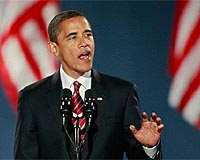| . |  |
. |
Moscow (AFP) Oct 6, 2009 A top Russian security official on Tuesday denied a report that Israel had confronted Moscow with evidence that Russian experts were helping Iran build an atomic bomb, news agencies reported. Nikolai Patrushev, head of Russia's national security council, said Moscow had received no information from foreign intelligence agencies about Russian companies or individuals helping Iran build a nuclear weapon. His comments came after Britain's Sunday Times, citing Russian and Israeli sources, reported that Israeli Prime Minister Benjamin Netanyahu had shown Russian leaders the evidence during a mysterious visit to Moscow last month. "At the moment I do not know of any secret services or other agencies having given us information about our companies or individuals," Patrushev said, quoted by Interfax news agency, in response to the report. "If they have such information, we will of course pay attention to it. But we do not have such information," added Patrushev, who is also a former chief of Russia's FSB security service. Netanyahu's swift visit to Moscow on September 7, initially kept secret by Israeli and Russian officials, has been the subject of intense speculation. The Sunday Times said that Netanyahu had presented a list of Russian atomic experts helping Iran with its nuclear programme during "a short, tense meeting" with Russian President Dmitry Medvedev and Prime Minister Vladimir Putin. Israeli officials believe the Russian experts were working with the approval of the Russian government, the British newspaper said. Tensions have mounted in recent months over Tehran's nuclear programme, especially with the revelation last month that Iran was building a previously undisclosed uranium enrichment facility near its holy city of Qom. The United States, European Union and Israel fear that Iran may be seeking to build atomic weapons under the guise of a civilian nuclear power programme, but Tehran insists that the programme is peaceful in nature. Russia is helping Iran build its first civilian nuclear power plant at the southern Iranian city of Bushehr, but Moscow says it is opposed to Tehran acquiring an atomic weapon.
earlier related report The Pew Research Center for the People and the Press survey found 61 percent of Americans believed it was more important "to prevent Iran from developing nuclear weapons, even if it means taking military action." Just 24 percent said it was more important "to avoid a military conflict with Iran, even if it means they may develop nuclear weapons." A further 15 percent were unsure, or agreed with both or neither statement. Most Americans, 63 percent, approve of the United States "negotiating directly with Iran over the issue of its nuclear program," with 28 percent opposed. But despite the strong support, 64 percent of the 1,500 people surveyed believe the talks will not succeed in getting Iran to give up its controversial nuclear program, which Tehran insists is for civilian energy but many in the international community fear masks a weapons program. The United States, along with Germany and fellow Security Council permanent members Britain, France, China and Russia, has restarted discussions with Iran on the nuclear program, with representatives from both sides meeting October 1 in Geneva for talks. President Barack Obama has held out the threat of tougher sanctions against Tehran if it fails to deliver concrete action, and 78 percent of Americans said they would support stronger economic sanctions. But just over half of Americans are unconvinced that even increased pressure in the form of sanctions would convince Tehran to abandon any nuclear ambitions, with 56 percent saying such punitive measures would fail and 32 percent convinced they would succeed. The telephone survey was conducted between September 30 and October 4. Share This Article With Planet Earth
Related Links Learn about nuclear weapons doctrine and defense at SpaceWar.com Learn about missile defense at SpaceWar.com All about missiles at SpaceWar.com Learn about the Superpowers of the 21st Century at SpaceWar.com
 Obama demands action from Iran after nuclear talks
Obama demands action from Iran after nuclear talksWashington (AFP) Oct 1, 2009 President Barack Obama Thursday demanded swift and "constructive" action from Iran following crucial nuclear talks, and warned that his patience for dialogue with the arch-US foe was limited. Obama conceded the meeting between world powers and Tehran in Geneva, which included the highest-level direct talks between the United States and Iran in three decades, was a "constructive" start to def ... read more |
|
| The content herein, unless otherwise known to be public domain, are Copyright 1995-2009 - SpaceDaily. AFP and UPI Wire Stories are copyright Agence France-Presse and United Press International. ESA Portal Reports are copyright European Space Agency. All NASA sourced material is public domain. Additional copyrights may apply in whole or part to other bona fide parties. Advertising does not imply endorsement,agreement or approval of any opinions, statements or information provided by SpaceDaily on any Web page published or hosted by SpaceDaily. Privacy Statement |